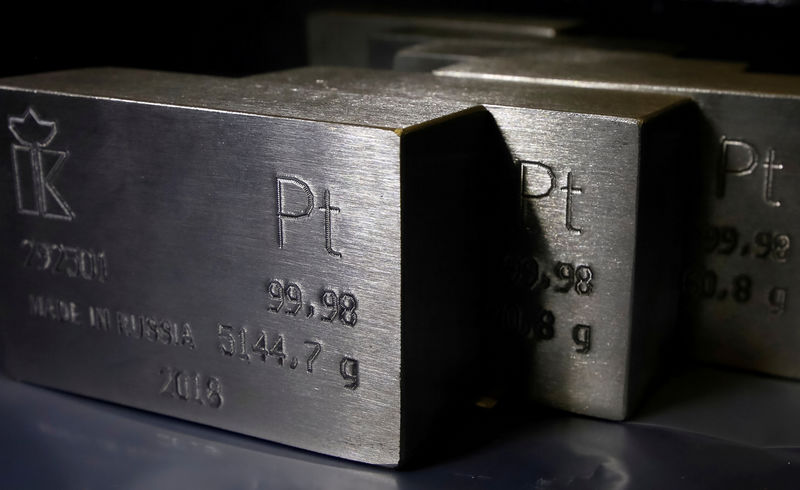By Eric Onstad
LONDON (Reuters) - Global automotive supplier Bosch expects platinum to play only a minor role in its new fuel cells, giving precious metal markets scant benefit even as the technology gains momentum for pollution-free transport.
According to Reuters calculations, Bosch would only need a tenth of the platinum used in current fuel cell vehicles.
Hopes of reviving demand and prices of platinum increasingly hinges on widespread uptake of fuel cells in vehicles, ships and trains to make up for dwindling amounts used in each device, analysts say.
The spot price of platinum has shed more than 40 percent in the last five years, burdened by persistent oversupply, before rebounding slightly in recent months.
But hopes that fuel cells will boost long-term demand may be dampened after Germany's Robert Bosch GmbH told Reuters that platinum was expected to play only a "minor role" in its plans to mass produce fuel cells.
Privately-owned Bosch, which last month signed a deal with Powercell Sweden AB to mass produce fuel cells, said its fuel cell design was not finalised, but it expects them to use only as much platinum as a diesel catalytic converter.
A catalytic converter in a diesel passenger vehicle typically uses three to seven grams of platinum compared with around 30-60 grams currently needed for a fuel cell for the same vehicle, according to analysts.
"There has been lots of optimization work concerning platinum in fuel cells," Achim Moritz, product manager for mobile fuel cells at Bosch, told Reuters.
"If you look at a diesel catalytic system, there is about the same amount of platinum content you need for a fuel cell," he added.
He declined to give specific estimated figures for the S3 fuel cell system it is developing with Powercell and expects to launch by 2022, citing commercial sensitivities.
TOYOTA ALSO SLASHES PLATINUM
Bosch's fuel cell deal with Powercell, announced last month, was another signal that the technology is poised to be rolled out more widely as governments toughen emissions regulations.
China is leading the way, targeting 2 million fuel cell vehicles by 2030.
Fuel cells generate electricity through a chemical reaction using hydrogen as a fuel and platinum as a catalyst, but comprise only a fraction of the electric vehicle (EV) market even though they allow vehicles to travel much longer distances between charges than battery powered cars.
For years, fuel cells were expected to boost platinum demand dramatically, but doubts have increased due to reports that scientists have found ways to cut the amount of platinum they contain.
The best selling fuel cell vehicle, Toyota's Mirai, is expected to cut platinum by two-thirds to around 10 grams per vehicle in its next version, down from 30 grams in the current model, according David Hart, director of E4tech consultancy, based in Lausanne.
"They (fuel cell makers) all have a pathway of using less platinum, which is fairly clear," Hart said.
Toyota Motor Corp declined to comment.
Hyundai Motor Co has cut the amount of platinum needed for the fuel cell stack in the latest edition of its NEXO, released last year, to 56 grams from 78 grams previously, a company spokesman told Reuters.
Hyundai plans to invest over 6 billion euros to make 700,000 fuel cell systems annually by 2030.
WIDER UPTAKE?
Fuel cells give EVs longer ranges and recharging takes a matter of minutes, a fraction of what is needed for batteries.
Hyundai's NEXO has a range of 380 miles compared to 226 miles for the best-selling battery electric vehicle, Nissan's Leaf.
That is especially useful for heavy goods vehicles and buses, which are expected to be the primary market for fuel cells initially.
"The heavy duty truck side is the biggest initial opportunity for fuel cells because they are very hard to electrify with batteries," said Mårten Wikforss, a consultant for Sweden's Powercell.
Batteries would take up more space in a heavy goods truck and would take hours to recharge.
Once costs come down, fuel cells may also appeal to car buyers who do not want to worry about frequent and time-consuming recharging.
If fuel cells catch on in ships and trains as well as road vehicles, platinum demand may get a boost despite the lower loadings due to the sheer numbers, some analysts said.
Global demand for platinum for all fuel cells from vehicles is forecast rise to 366,000 ounces by 2030 but to surge to 965,000 ounces when including other fuel cell and hydrogen uses, said Jonathan Butler, head of business development at Mitsubishi Corp.
